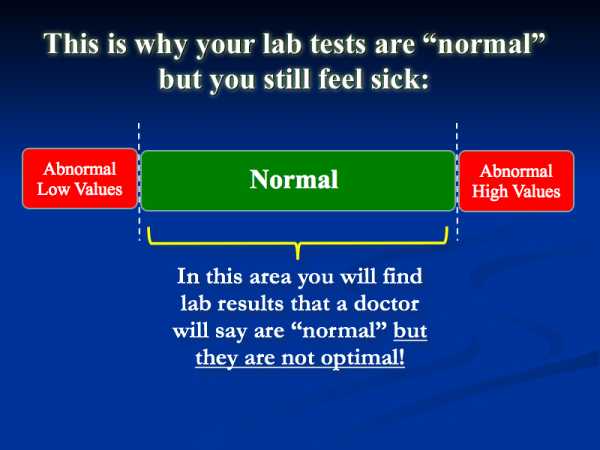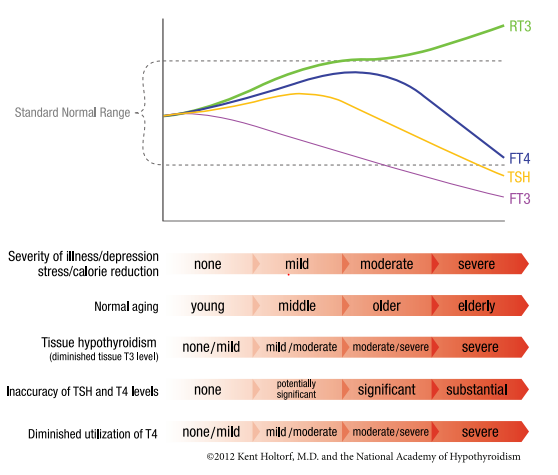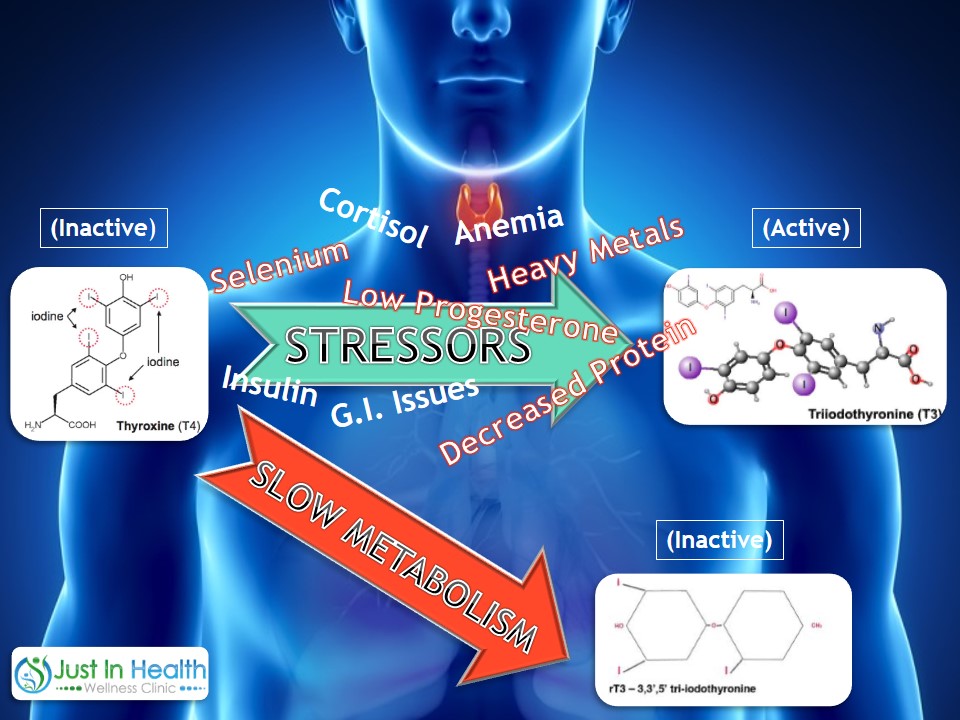
By Dr. Justin Marchegiani
I see patients all the time in my practice who tell me they have low thyroid symptoms, like fatigue, weight gain, hair loss, depression, cold hands, and cold feet. If the TSH test doesn't show up out of range on a conventional thyroid blood test, the typical response from the average medical doctor will be something like this: “It’s all in your head,” or “You may benefit from taking an antidepressant.”
If you’re a woman, it may be blamed on female hormone issues. And so the next solution may be to go on a birth control pill to help normalize your cycle.
Intuitively, people know something’s wrong with their thyroid even if their lab tests aren't totally in the red. The most common response I hear in my practice—
“My lab tests are normal, but I still don’t feel well!”
The problem with this scenario is there are physiological, biochemical, and hormonal explanations for why patients feel the way they do. Conventional medicine typically gives these patients no answers. And, worst of all, can sometimes make them feel as if they’re making it up.
In the world of functional medicine, we tend to look at things differently from your conventional medical doctor. Most lab tests have originated to include 95% of the population into the normal values. So if your medical doctor tells you your labs look fine, that just means you fit into that 95% category. Or this may mean you are two standard deviations away from the mean, if you are into statistics.
Anyone that has walked around an airport for just a little bit of time will be able to tell you 95% of the population doesn’t fit into the healthy category. Conventional medicine makes a massive assumption that the absence of disease is health. This is like saying the absence of being poor on the street means you’re rich! I hope my analogies help drive the point home that these assumptions are absurd!

As society gets sicker and sicker and sicker, we know the reference ranges get wider and wider and wider. So if you are someone that may have been healthy to begin with and then have a sudden drop in your health, you may still fall within that normal reference range. And thus being told nothing is wrong.
It’s really not your medical doctor’s fault. Conventional medicine trains physicians to look for pathologies or disease, and this is a good thing. Where this paradigm falls short is when you aren’t sick enough to fall into the category of being diagnosed with a disease. So what do you do next?
Essentially, conventional medicine is saying, “Go home, continue doing what you’re doing, get sicker, and then maybe we’ll be able to diagnose you with something in a few years.” Intuitively, that doesn’t sound right to me. We need to look at things in a more sensitive way so we can pick up this slow and steady breakdown before it becomes a major problem.
Your body is designed to adapt to stress, and maladaptation is the number one sign that your health is starting to decline. If your body loses the ability to adapt to the various stressors in your life, you will eventually come down with some type of disease.
The goal of functional medicine is to figure out where the underlying stressors are coming from. Using specific lab markers that are sensitive, we can chart your overall health function on a spectrum so as we start incorporating treatments, we have objective and subjective markers of improvement.
Functional medicine can look at the exact same labs and potentially pick up subtle things that conventional medicine may not. Click here to get your labs assessed.
Most people have low thyroid symptoms even though their thyroid lab tests are normal! The standard panels that are looked at are typically a TSH test (a brain hormone) and T4 test (a storage thyroid hormone). It always bothers me that conventional doctors very rarely look at the active thyroid hormone (T3) to assess a thyroid problem. Especially since the research over time has shown that TSH testing isn’t the best to assess thyroid function. If TSH is elevated, it’s a surefire sign of thyroid dysfunction, but it’s a marker that tends to elevate late in the game.
Above are the markers that I commonly run on my patients to assess which pattern of thyroid dysfunction they have. Thyroid antibodies are also looked at to assess if there is an autoimmune disease at play. Most conventional physicians totally ignore thyroid antibody testing completely because it doesn't change the conventional treatment; Synthroid will be given either way. Knowing whether or not a patient has an autoimmune thyroid disease (Hashimoto’s thyroiditis) can make all the difference in the world.
When we are dealing with Hashimoto’s, it’s the immune system that is out of balance and destroying the thyroid gland. It doesn’t make sense to put all of our focus on the thyroid gland if the immune system is attacking it daily.
Some people with Hashimoto’s (hypothyroidism) may need thyroid hormone depending on how bad the damages are. I always recommend getting a full assessment like the one above before it is recommended. Hashimoto’s patients will typically respond better on a combination of T3 and T4, like in Nature-Throid, or a bioidentical thyroid glandular instead of a synthetic T4 medication.
Click here to run a comprehensive thyroid panel like the one mentioned above.
Research has shown that that T4 and TSH are poor indicators of thyroid function. According to Dr. Kent Holtorf at the National Academy of Hypothyroidism, increased reverse T3 levels and decreased T3 levels have an association with hypothyroidism or low thyroid function.

In other words, the tissues weren't getting access to thyroid hormone because the thyroid hormone wasn't converting properly and the receptor sites were being blocked by reverse T3.
Many factors can affect thyroid hormone conversion (see chart below). An increase in reverse T3 blocks the thyroid receptor site; this is where free T3 would normally bind and have a metabolic effect on the body.
Reverse T3 is also shown to be a more potent inhibitor of thyroid conversion, even more than the pharmaceutical drug propylthiouracil (PTU). Research has shown that reverse T3 is nearly 33–100 times more potent than the medication PTU, which is given to patients with hyperthyroidism.
It's amazing that reverse T3 isn't a marker that is run on all thyroid patients.

One of the best tests to asses overall thyroid function is the total T3/reverse T3 ratio. A range of 10–14 is a healthy thyroid level.
Click here to receive more great information like this!
Most lab testing to assess thyroid function is inadequate at best, and even if thyroid imbalances are found, the solutions tend to be the same for each and every patient.
If you are told that your lab tests are normal but you know something deeper is wrong, you are probably correct. Most of these problems if left alone only get worse and take more time and money to fix later on.
If you need help getting to the bottom of your health challenges, click here!
References:
2. http://www.holtorfmed.com/download/thyroid-fatigue-and-weight-loss/Low_Cellular_T3.pdf